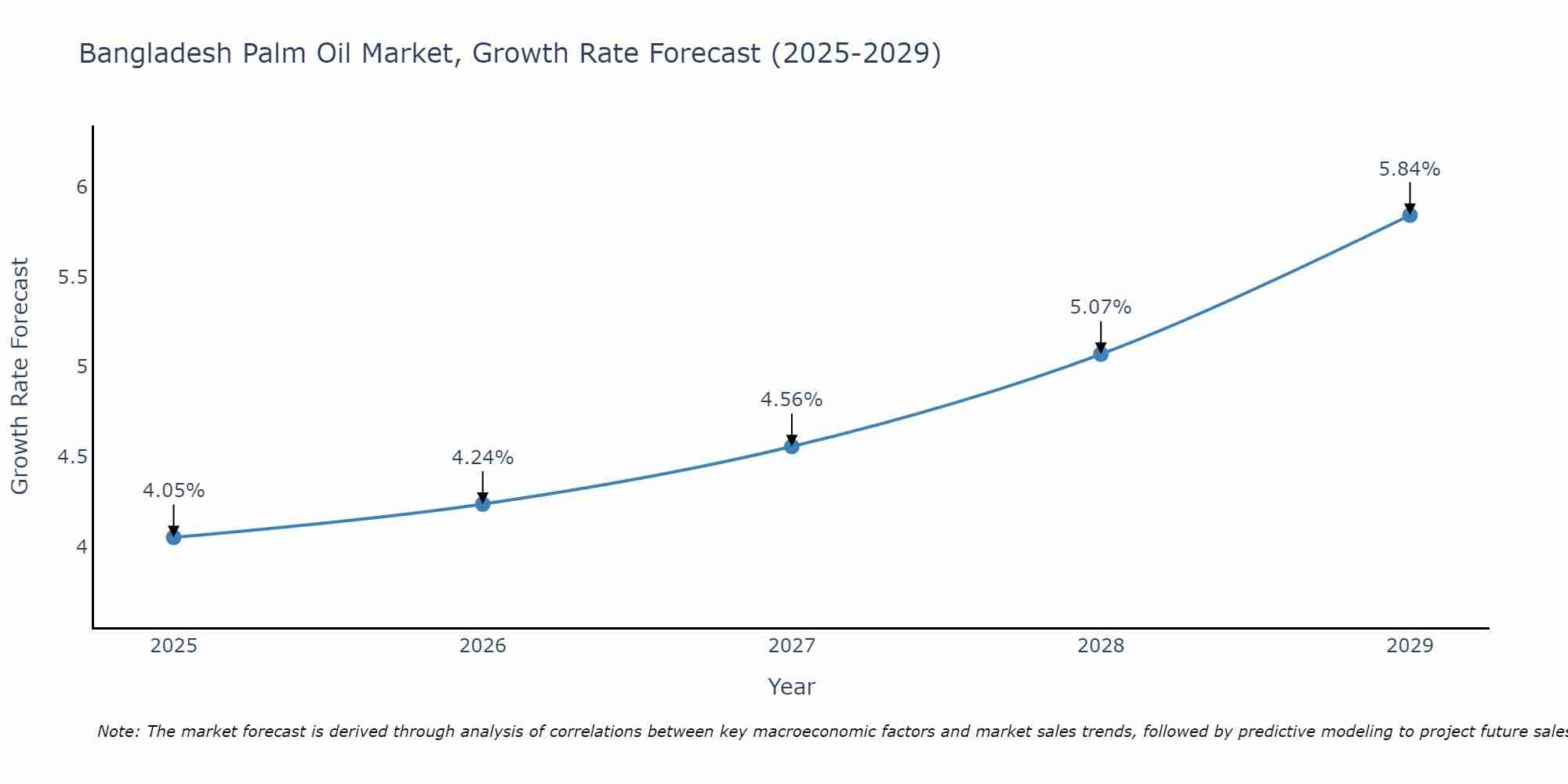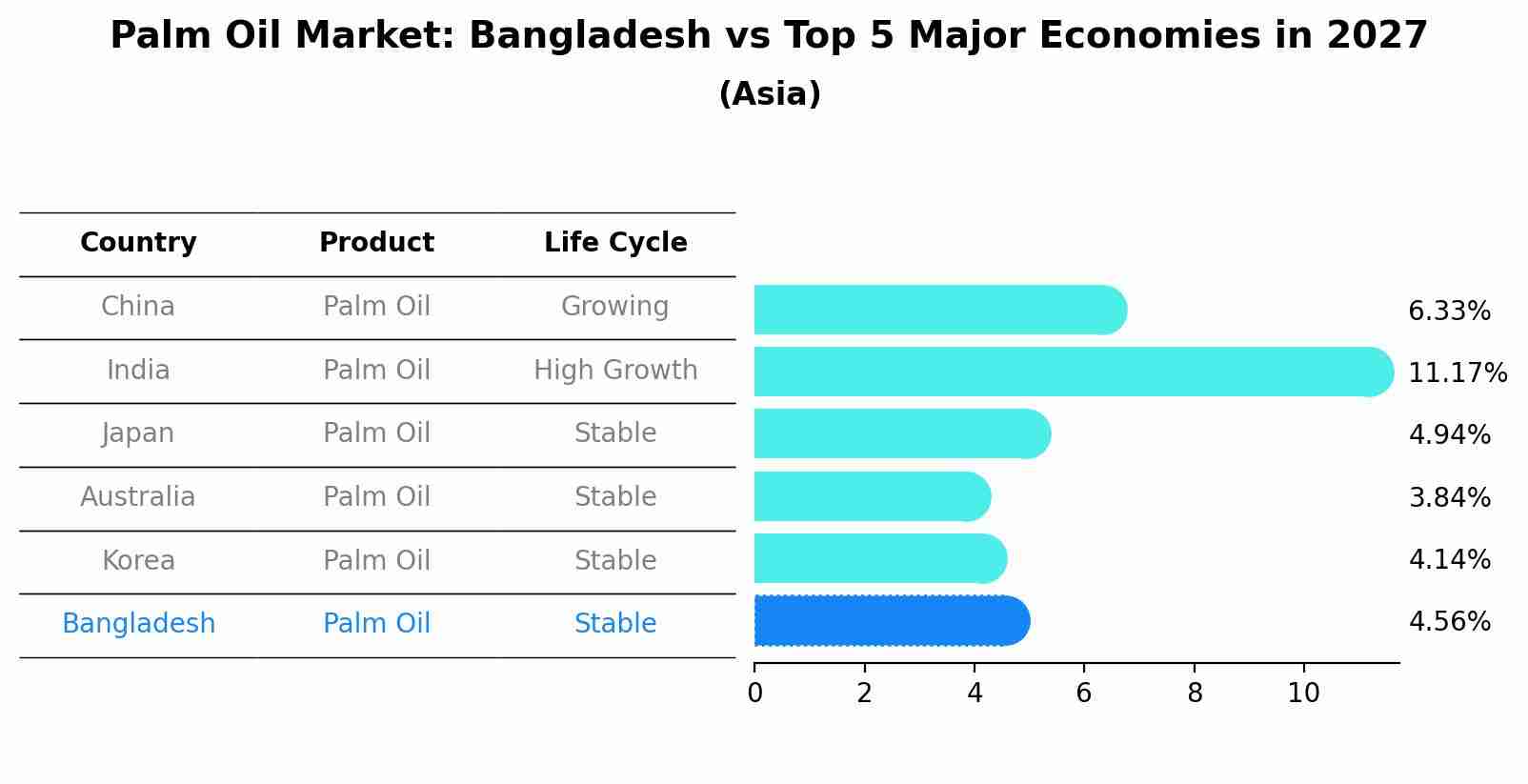Bangladesh Palm Oil Market (2025-2031) Outlook | Revenue, Share, Size, Trends, Companies, Forecast, Value, Growth, Industry & Analysis
| Product Code: ETC383792 | Publication Date: Aug 2022 | Updated Date: Jul 2025 | Product Type: Market Research Report | |
| Publisher: 6Wresearch | Author: Shubham Padhi | No. of Pages: 75 | No. of Figures: 35 | No. of Tables: 20 |
Bangladesh Palm Oil Market Size Growth Rate
The Bangladesh Palm Oil Market is likely to experience consistent growth rate gains over the period 2025 to 2029. From 4.05% in 2025, the growth rate steadily ascends to 5.84% in 2029.

Palm Oil Market: Bangladesh vs Top 5 Major Economies in 2027 (Asia)
The Palm Oil market in Bangladesh is projected to grow at a stable growth rate of 4.56% by 2027, highlighting the country's increasing focus on advanced technologies within the Asia region, where China holds the dominant position, followed closely by India, Japan, Australia and South Korea, shaping overall regional demand.

Bangladesh Palm Oil Market Synopsis
The Bangladesh palm oil market is experiencing steady growth driven by factors such as increasing demand for vegetable oils, population growth, and expanding food processing industry. Palm oil is a key ingredient in various food products, such as cooking oil, margarine, and snacks, making it a crucial commodity in the country. The market is also influenced by government policies, import regulations, and international price fluctuations. However, sustainability concerns and environmental issues related to palm oil production have led to some consumer backlash and calls for more responsible sourcing practices. Overall, the Bangladesh palm oil market presents opportunities for both local and international players to cater to the growing demand while addressing sustainability challenges.
Bangladesh Palm Oil Market Trends
The Bangladesh Palm Oil Market is witnessing several key trends. One significant trend is the increasing demand for sustainable and certified palm oil products due to growing awareness about environmental and social issues associated with palm oil production. Consumers are becoming more conscious about the sourcing and production practices of palm oil, leading to a shift towards sustainable options. Additionally, the food industry in Bangladesh is incorporating palm oil in various products such as cooking oil, processed foods, and snacks, driving the market growth. The government`s initiatives to promote palm oil cultivation and reduce dependency on imports are also influencing the market dynamics. Overall, sustainability, consumer awareness, and government support are shaping the current trends in the Bangladesh Palm Oil Market.
Bangladesh Palm Oil Market Challenges
In the Bangladesh Palm Oil Market, one of the main challenges faced is the competition from other vegetable oils such as soybean oil and sunflower oil. These substitutes often have lower prices, leading to price sensitivity among consumers. Additionally, the issue of sustainability and environmental concerns surrounding palm oil production has become a significant challenge for industry players. The negative impact of deforestation, habitat destruction, and social issues in palm oil-producing regions has resulted in a growing demand for sustainably sourced palm oil products. Meeting these sustainability requirements while ensuring cost-effectiveness presents a major hurdle for companies operating in the Bangladesh Palm Oil Market. Furthermore, fluctuations in global palm oil prices and government regulations regarding imports also contribute to the complexities faced by market players in Bangladesh.
Bangladesh Palm Oil Market Investment Opportunities
The Bangladesh Palm Oil Market presents promising investment opportunities due to the country`s increasing demand for edible oils, driven by a growing population and changing dietary habits. Investing in palm oil plantations or processing facilities in Bangladesh can be lucrative, as the country relies heavily on imports to meet its domestic demand. With government support for the agriculture sector and favorable climatic conditions for palm cultivation, there is potential for sustainable growth in this sector. Additionally, diversification into value-added products such as palm oil-based biofuels or oleochemicals could further enhance investment returns. However, investors should also consider environmental and social sustainability factors, as the palm oil industry has faced criticism for deforestation and human rights issues in other regions.
Jordan Agar Market Government Policies
The Bangladesh government has implemented various policies related to the palm oil market, including import regulations to control the inflow of palm oil into the country and ensure fair competition for domestic producers. In recent years, there have been efforts to promote sustainable palm oil production and consumption to address environmental concerns and social issues associated with the industry. The government has also introduced initiatives to increase domestic production of palm oil through incentives and support for farmers. Additionally, there are ongoing discussions on setting quality standards for palm oil imports to ensure product safety and consumer protection in the market. Overall, the government`s policies aim to regulate the palm oil market, promote sustainable practices, and support domestic production to meet the country`s demand.
Bangladesh Palm Oil Market Future Outlook
The future outlook for the Bangladesh Palm Oil Market appears positive, driven by factors such as increasing demand for edible oils due to population growth and rising disposable incomes. The government`s focus on promoting domestic production and reducing reliance on imports is likely to boost the palm oil industry. Additionally, growing awareness about the health benefits of palm oil and its versatile applications in various industries such as food, cosmetics, and biofuel are expected to drive market growth. However, challenges such as environmental concerns surrounding palm oil production and competition from other edible oils may hinder the market`s expansion. Overall, with strategic initiatives and increasing consumer demand, the Bangladesh Palm Oil Market is poised for steady growth in the coming years.
Key Highlights of the Report:
- Bangladesh Palm Oil Market Outlook
- Market Size of Bangladesh Palm Oil Market, 2024
- Forecast of Bangladesh Palm Oil Market, 2031
- Historical Data and Forecast of Bangladesh Palm Oil Revenues & Volume for the Period 2021 - 2031
- Bangladesh Palm Oil Market Trend Evolution
- Bangladesh Palm Oil Market Drivers and Challenges
- Bangladesh Palm Oil Price Trends
- Bangladesh Palm Oil Porter's Five Forces
- Bangladesh Palm Oil Industry Life Cycle
- Historical Data and Forecast of Bangladesh Palm Oil Market Revenues & Volume By Nature for the Period 2021 - 2031
- Historical Data and Forecast of Bangladesh Palm Oil Market Revenues & Volume By Organic for the Period 2021 - 2031
- Historical Data and Forecast of Bangladesh Palm Oil Market Revenues & Volume By Conventional for the Period 2021 - 2031
- Historical Data and Forecast of Bangladesh Palm Oil Market Revenues & Volume By Product for the Period 2021 - 2031
- Historical Data and Forecast of Bangladesh Palm Oil Market Revenues & Volume By CPO for the Period 2021 - 2031
- Historical Data and Forecast of Bangladesh Palm Oil Market Revenues & Volume By RBD Palm Oil for the Period 2021 - 2031
- Historical Data and Forecast of Bangladesh Palm Oil Market Revenues & Volume By Palm Kernel Oil for the Period 2021 - 2031
- Historical Data and Forecast of Bangladesh Palm Oil Market Revenues & Volume By Fractionated Palm Oil for the Period 2021 - 2031
- Historical Data and Forecast of Bangladesh Palm Oil Market Revenues & Volume By End-use for the Period 2021 - 2031
- Historical Data and Forecast of Bangladesh Palm Oil Market Revenues & Volume By Food & Beverage for the Period 2021 - 2031
- Historical Data and Forecast of Bangladesh Palm Oil Market Revenues & Volume By Personal Care & Cosmetics for the Period 2021 - 2031
- Historical Data and Forecast of Bangladesh Palm Oil Market Revenues & Volume By Biofuel & Energy for the Period 2021 - 2031
- Historical Data and Forecast of Bangladesh Palm Oil Market Revenues & Volume By Pharmaceuticals for the Period 2021 - 2031
- Historical Data and Forecast of Bangladesh Palm Oil Market Revenues & Volume By Others for the Period 2021 - 2031
- Bangladesh Palm Oil Import Export Trade Statistics
- Market Opportunity Assessment By Nature
- Market Opportunity Assessment By Product
- Market Opportunity Assessment By End-use
- Bangladesh Palm Oil Top Companies Market Share
- Bangladesh Palm Oil Competitive Benchmarking By Technical and Operational Parameters
- Bangladesh Palm Oil Company Profiles
- Bangladesh Palm Oil Key Strategic Recommendations
Frequently Asked Questions About the Market Study (FAQs):
- Single User License$ 1,995
- Department License$ 2,400
- Site License$ 3,120
- Global License$ 3,795
Search
Thought Leadership and Analyst Meet
Our Clients
Related Reports
- Afghanistan Rocking Chairs And Adirondack Chairs Market (2026-2032) | Size & Revenue, Competitive Landscape, Share, Segmentation, Industry, Value, Outlook, Analysis, Trends, Growth, Forecast, Companies
- Afghanistan Apparel Market (2026-2032) | Growth, Outlook, Industry, Segmentation, Forecast, Size, Companies, Trends, Value, Share, Analysis & Revenue
- Canada Oil and Gas Market (2026-2032) | Share, Segmentation, Value, Industry, Trends, Forecast, Analysis, Size & Revenue, Growth, Competitive Landscape, Outlook, Companies
- Germany Breakfast Food Market (2026-2032) | Industry, Share, Growth, Size, Companies, Value, Analysis, Revenue, Trends, Forecast & Outlook
- Australia Briquette Market (2025-2031) | Growth, Size, Revenue, Forecast, Analysis, Trends, Value, Share, Industry & Companies
- Vietnam System Integrator Market (2025-2031) | Size, Companies, Analysis, Industry, Value, Forecast, Growth, Trends, Revenue & Share
- ASEAN and Thailand Brain Health Supplements Market (2025-2031) | Strategy, Consumer Insights, Analysis, Investment Trends, Opportunities, Growth, Size, Share, Industry, Revenue, Segments, Value, Segmentation, Supply, Forecast, Restraints, Outlook, Competition, Drivers, Trends, Demand, Pricing Analysis, Competitive, Strategic Insights, Companies, Challenges
- ASEAN Bearings Market (2025-2031) | Strategy, Consumer Insights, Analysis, Investment Trends, Opportunities, Growth, Size, Share, Industry, Revenue, Segments, Value, Segmentation, Supply, Forecast, Restraints, Outlook, Competition, Drivers, Trends, Demand, Pricing Analysis, Competitive, Strategic Insights, Companies, Challenges
- Europe Flooring Market (2025-2031) | Outlook, Share, Industry, Trends, Forecast, Companies, Revenue, Size, Analysis, Growth & Value
- Saudi Arabia Manlift Market (2025-2031) | Outlook, Size, Growth, Trends, Companies, Industry, Revenue, Value, Share, Forecast & Analysis
Industry Events and Analyst Meet
Whitepaper
- Middle East & Africa Commercial Security Market Click here to view more.
- Middle East & Africa Fire Safety Systems & Equipment Market Click here to view more.
- GCC Drone Market Click here to view more.
- Middle East Lighting Fixture Market Click here to view more.
- GCC Physical & Perimeter Security Market Click here to view more.
6WResearch In News
- Doha a strategic location for EV manufacturing hub: IPA Qatar
- Demand for luxury TVs surging in the GCC, says Samsung
- Empowering Growth: The Thriving Journey of Bangladesh’s Cable Industry
- Demand for luxury TVs surging in the GCC, says Samsung
- Video call with a traditional healer? Once unthinkable, it’s now common in South Africa
- Intelligent Buildings To Smooth GCC’s Path To Net Zero


















